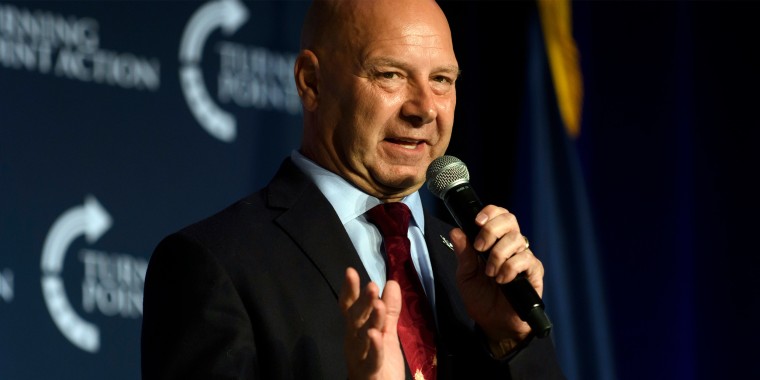There is no air of mystery surrounding Doug Mastriano. The Pennsylvania Republican has an ugly record that he makes no effort to avoid and abhorrent views that he makes no effort to deny. The GOP’s gubernatorial nominee in the Keystone State is exactly who he appears to be.
Mastriano is a climate denier. Mastriano is also an election denier who appears to have breached Capitol barriers on Jan. 6 and took the lead in Pennsylvania trying to overturn Donald Trump’s defeat in the state — including playing a role in the fake electors scheme. The Republican is also an anti-gay, anti-Muslim conspiracy theorist with ties to QAnon and anti-Semites that cannot be easily explained away.
Mastriano is so extreme that “panicked“ GOP officials in the state desperately tried to prevent him from winning the party’s gubernatorial nomination, convinced that the right-wing state senator’s radicalism was so over the top that he simply couldn’t run a credible race for the commonwealth’s top job.
Republican voters backed him anyway — and now party officials are falling in line, indifferent to everything they know about him. The New York Times reported over the weekend:
In one of the most closely watched governor’s races of the year, Pennsylvania Republican officials who had warned that Mr. Mastriano was unelectable have largely closed ranks behind him, after he proved to be the overwhelming choice of base Republicans.
In fairness, it’s worth emphasizing that not everyone in the Pennsylvania GOP has put the party’s interests over the public’s interests. Last month, state Attorney General Josh Shapiro, the Democratic nominee, touted endorsements from some prominent Pennsylvania Republicans, including two former GOP congressmen.
But in general, even members of the party that scrambled to deny Mastriano the nomination have embraced the political calculation: Electing one of the most radical gubernatorial nominees in the nation is fine, because partisanship trumps every other consideration.
Indeed, Gov. Ron DeSantis was so indifferent to Mastriano’s extremism that the Floridian traveled to Pittsburgh late last week for a joint appearance with the right-wing legislator.
At the federal level, eight of Pennsylvania’s nine-member Republican congressional delegation — everyone except Rep. Brian Fitzpatrick — also recently signed a letter of support for Mastriano.
As Politico recently noted, the broader pattern is familiar: “GOP leaders rushed to stop him in the primary. When he won anyway, some polls unexpectedly showed him within reach of his Democratic rival, and the Republican establishment began to warm to him. But then he was engulfed by controversy — exactly the kind that GOP insiders had previously worried could sink his chances.”
The description applies equally to Donald Trump and Mastriano, though the controversy Politico referenced was different from the former president’s scandals:
In an election season in which inflation and high gas prices have given most Republicans an edge, Mastriano has spent the past few weeks under fire for his ties to a far-right social media platform. He had an account this year on Gab, the site where Robert Bowers made violent antisemitic comments before the shooting at the Tree of Life synagogue in Pittsburgh. Mastriano also told Gab CEO Andrew Torba in an interview, “Thank God for what you’ve done,” and paid the site $5,000 for “consulting” services.
“People that were not happy with his nomination — this is why,” Josh Novotney, a GOP consultant in Pennsylvania, said two weeks ago.
Perhaps not, but as Election Day draws closer, Republicans are pretending those concerns no longer matter.

